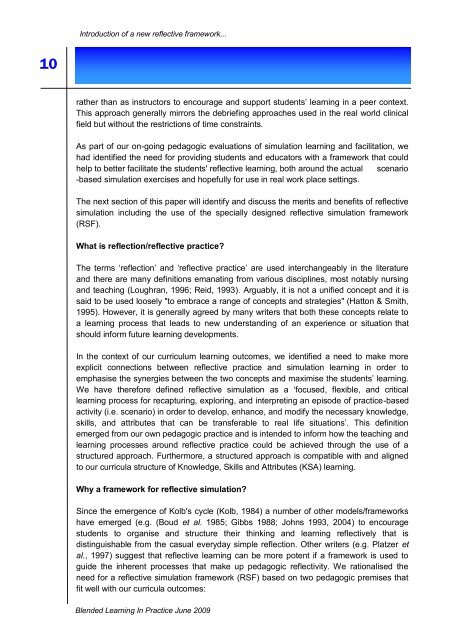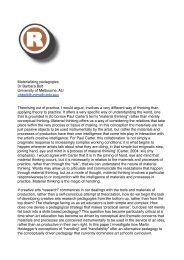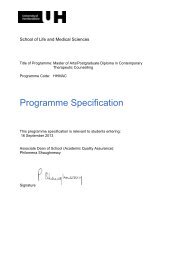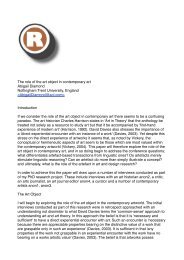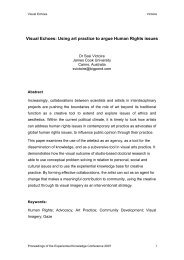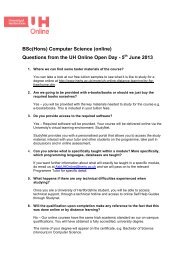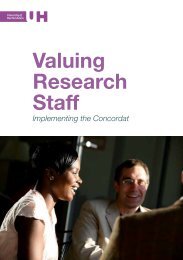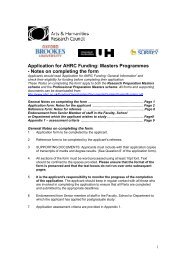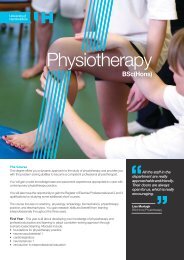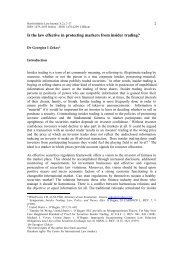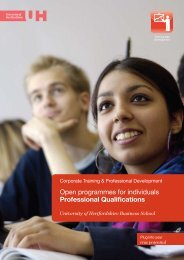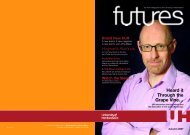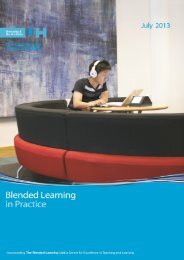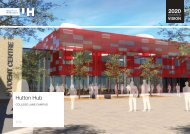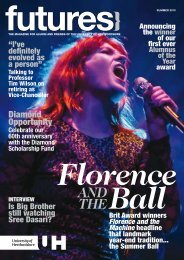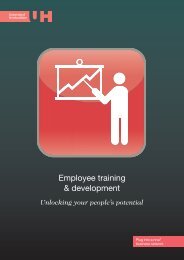June 2009 - University of Hertfordshire
June 2009 - University of Hertfordshire
June 2009 - University of Hertfordshire
Create successful ePaper yourself
Turn your PDF publications into a flip-book with our unique Google optimized e-Paper software.
Introduction <strong>of</strong> a new reflective framework...<br />
10<br />
rather than as instructors to encourage and support students‟ learning in a peer context.<br />
This approach generally mirrors the debriefing approaches used in the real world clinical<br />
field but without the restrictions <strong>of</strong> time constraints.<br />
As part <strong>of</strong> our on-going pedagogic evaluations <strong>of</strong> simulation learning and facilitation, we<br />
had identified the need for providing students and educators with a framework that could<br />
help to better facilitate the students' reflective learning, both around the actual scenario<br />
-based simulation exercises and hopefully for use in real work place settings.<br />
The next section <strong>of</strong> this paper will identify and discuss the merits and benefits <strong>of</strong> reflective<br />
simulation including the use <strong>of</strong> the specially designed reflective simulation framework<br />
(RSF).<br />
What is reflection/reflective practice?<br />
The terms „reflection‟ and „reflective practice‟ are used interchangeably in the literature<br />
and there are many definitions emanating from various disciplines, most notably nursing<br />
and teaching (Loughran, 1996; Reid, 1993). Arguably, it is not a unified concept and it is<br />
said to be used loosely "to embrace a range <strong>of</strong> concepts and strategies" (Hatton & Smith,<br />
1995). However, it is generally agreed by many writers that both these concepts relate to<br />
a learning process that leads to new understanding <strong>of</strong> an experience or situation that<br />
should inform future learning developments.<br />
In the context <strong>of</strong> our curriculum learning outcomes, we identified a need to make more<br />
explicit connections between reflective practice and simulation learning in order to<br />
emphasise the synergies between the two concepts and maximise the students‟ learning.<br />
We have therefore defined reflective simulation as a „focused, flexible, and critical<br />
learning process for recapturing, exploring, and interpreting an episode <strong>of</strong> practice-based<br />
activity (i.e. scenario) in order to develop, enhance, and modify the necessary knowledge,<br />
skills, and attributes that can be transferable to real life situations‟. This definition<br />
emerged from our own pedagogic practice and is intended to inform how the teaching and<br />
learning processes around reflective practice could be achieved through the use <strong>of</strong> a<br />
structured approach. Furthermore, a structured approach is compatible with and aligned<br />
to our curricula structure <strong>of</strong> Knowledge, Skills and Attributes (KSA) learning.<br />
Why a framework for reflective simulation?<br />
Since the emergence <strong>of</strong> Kolb's cycle (Kolb, 1984) a number <strong>of</strong> other models/frameworks<br />
have emerged (e.g. (Boud et al. 1985; Gibbs 1988; Johns 1993, 2004) to encourage<br />
students to organise and structure their thinking and learning reflectively that is<br />
distinguishable from the casual everyday simple reflection. Other writers (e.g. Platzer et<br />
al., 1997) suggest that reflective learning can be more potent if a framework is used to<br />
guide the inherent processes that make up pedagogic reflectivity. We rationalised the<br />
need for a reflective simulation framework (RSF) based on two pedagogic premises that<br />
fit well with our curricula outcomes:<br />
Blended Learning In Practice <strong>June</strong> <strong>2009</strong>


